GA CR Presidium
The GACR Presidium members are appointed and recalled by the Government of the Czech Republic on the basis of Research, Development and Innovation Council’s proposal. The Presidium consists of five members, who represent five basic science fields – Technical Sciences, Physical Sciences, Medical and Biological Sciences, Social Sciences and Humanities and Agricultural and Biological-Environmental Sciences. Members of the Presidium are appointed for four years with the possibility of two consecutive terms at maximum. GACR President is the statutory body of GACR.
The Presidium is authorised to approve calls for proposals, to award grants, present proposals of the GACR Statute and its changes together with the GACR budget proposal to the Government for approval. Moreover, the Presidium is responsible for coordination of the Discipline Committees, advisory bodies of GACR, which evaluate the project proposals.
The Presidium approves calls for proposals in research and development and decides on concluding agreements on provision of support, i.e. on awarding the grants based on the evaluation of Discipline Committees and Panels of GACR. Additionally, the Presidium coordinates activities of the advisory bodies, appoints and removes their members.
Current Presidium members
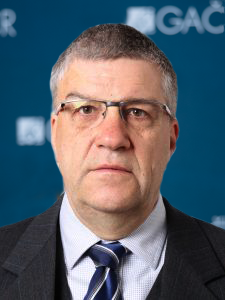
Professor Milan Jirsa is the Head of the Laboratory of Experimental Hepatology and Deputy Director of the Experimental Medicine Centre at IKEM. He is also a lecturer, supervisor and member of the doctoral study committee at Charles University, as well as at the University of Chemical Technology.
He graduated from the Faculty of General Medicine and Faculty of Science, Charles University. His professorship was awarded by the First Faculty of Medicine, Charles University. After obtaining a specialised qualification in clinical biochemistry, he began to study photodynamic therapy of tumours, and subsequently moved on to the study of disorders and molecular mechanisms of bile secretion. He went on to broaden his interest to include the genetics of liver diseases. His work has contributed to the understanding of the molecular cause of hereditary hepatitis, metabolic liver diseases, and congenital amyloidosis type AA. Prof. Jirsa is involved in the study of inherited diseases, including factors predisposing to rapid progression of liver damage of various etiologies, and to the development of hepatocellular carcinoma, as well as ways to counteract their influence.
Throughout his scientific career to date, he has published more than 80 original research papers in international journals and supervised 10 PhD students and postdocs. During his career, he has received and led a number of research grants. He completed a long-term residency at the Academisch Medisch Centrum in Amsterdam. His work has been awarded the Minister of Health Award, recognised by the Czech Hepatology Society, and an honorary membership in the Czech Society of Clinical Biochemistry, as well as the Bares Award. He is the chair of the scientific board at IKEM, a member of the scientific boards of the Faculty of Health Care at the Prešov University (Slovakia), and the Crigler-Najjar Stichting in the Netherlands. Prof. Jirsa also serves on the editorial boards of several prominent international journals.
Since April 2019, Prof. Jirsa has served as a panel member at the Czech Science Foundation. In November 2021 he became a member of the GACR Presidium, and now in January 2025, he assumes the position of GACR President.
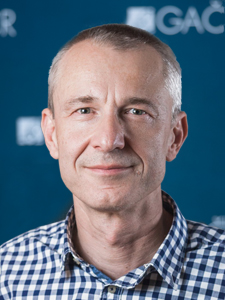
Prof. Hartl graduated in mechanical engineering at the Brno University of Technology. He became Associate Professor of Structural and Process Engineering in 2002 and four years later was appointed Professor of Structural and Process Engineering.
Prof. Hartl’s scientific, research and development activities are mainly focused on tribology, biotribology and high-pressure rheology. He participated in the establishment of the tribology research group at the Faculty of Mechanical Engineering of the Brno University of Technology, which has gained an international reputation especially in the field of elastohydrodynamics. He developed and implemented a method of colorimetric interferometry, enabling the determination and visualization of lubricating film thickness distribution in elastohydrodynamic contact. The method is now used by a number of research institutions worldwide.
He has published more than 120 scientific articles in high-impact journals. The acclaim of his work is evidenced by more than 1,800 citations and an H-index of 21 according to Web of Science. He has received several awards for his work, such as the Society of Tribologists and Lubrication Engineers award, and the Japanese Society of Tribologists award.
He is the director of the Institute of Machine and Industrial Design at the Faculty of Mechanical Engineering of the Brno University of Technology, which he transformed into an internationally recognized research and educational institution. He is the principal investigator within several strategic projects. He has been developing a research-oriented concept of teaching on a long-term basis.
He is the guarantor of the Master’s degree programme in Structural Engineering, which he founded, and the Doctoral degree programme in Structural and Process Engineering. He is a supervisor in doctoral studies and 7 students have defended their dissertations under his supervision. He led the translation team and scientific editorial board for the Czech translation of the world-renowned textbook Shigley’s Mechanical Engineering Design.
He was appointed member of the Presidium of the Czech Science Foundation in March 2022.
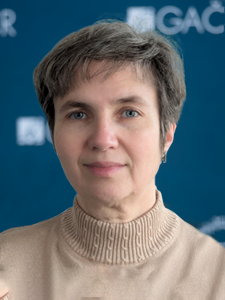
Born in 1972 in Frýdek-Místek. She graduated in geophysics from the Faculty of Mathematics and Physics of the Charles University, and completed her doctoral studies in 1996. She completed a two-year postdoctoral fellowship at the Faculty of Earth Sciences of the Utrecht University, and has worked since 1999 at the Department of Geophysics of the Faculty of Mathematics and Physics of the Charles University. She was appointed Associate Professor of Geophysics in 2009, and has headed the Geophysics Department since 2022.
Her research interests include computer modelling of convection in the Earth’s mantle, focusing on the influence of mantle rock rheology, and implications for deep seismicity. She collaborates on research projects with colleagues in the United States and the Netherlands. She visits the University of Utrecht regularly as part of a Visiting Research Fellowship of The Netherlands Research Centre for Integrated Solid Earth Science. As a Principal Investigator and Co-investigator, she is involved in Czech and international projects. She is a regular speaker at international conferences including invited talks. She has served on the organizing committees of several international conferences.
She is a lecturer at the Faculty of Mathematics and Physics, supervisor of bachelor, diploma and doctoral theses. Since 2012, she has been a supervisor of the PhD programme in Physics of the Earth and Planets (formerly Geophysics) at the Faculty of Mathematics and Physics of the Charles University, and acted as an ad-hoc member of the PhD thesis defense committees at the Faculty of Earth Sciences, Utrecht University. She is Vice-Chair of the Board of the Institute of Geophysics, Czech Academy of Sciences. She has served on panels P210 and P209 of the Czech Science Foundation, discipline committee DC2, and has chaired the discipline committee since 2023.
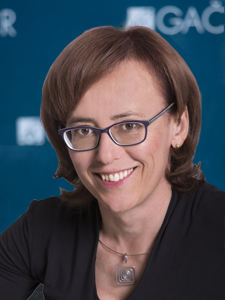 Assoc. Prof. PhDr. Martina Hřebíčková, DSc. (née Míčková, born in 1963 in Opava) graduated in psychology and Russian language at the Faculty of Arts of the Masaryk University in Brno, where she continued her further studies in psychology. She completed her doctoral studies in 2005 at the Faculty of Arts of Charles University in Prague. In 2009, she defended her dissertation and was awarded the degree of Doctor of Social Sciences and Humanities (DSc.) by the Czech Academy of Sciences (CAS). She received her associate professorship in general psychology in 2013 at the Faculty of Arts, Masaryk University. She works at the Institute of Psychology of the CAS. The focus of her research interest is personality psychology and social psychology. She researches personality traits and what is called the Five Factor Model (FFM). She also deals with social perception, intergroup relations and acculturation. She has contributed to more than 80 publications indexed in WoS, and is one of the most frequently cited social scientists in the country. In the 1990s, she spent a year as a student at the University of Bielefeld, Germany. She has also completed a number of short stays abroad (e.g. USA, Finland, UK). She is also involved in applied research. She is validating methods for trait diagnosis, which are also applied in psychological practice. On the basis of her extensive international contacts and her reputation, she receives invitations from prominent foreign scientists to collaborate on international projects, and she also regularly presents at international conferences, including invitation-only symposia. She has served on the scientific committees of several international conferences, on the steering committee of the European Association of Personality Psychology, and is also an editor of the international journal Personality Science.
Assoc. Prof. PhDr. Martina Hřebíčková, DSc. (née Míčková, born in 1963 in Opava) graduated in psychology and Russian language at the Faculty of Arts of the Masaryk University in Brno, where she continued her further studies in psychology. She completed her doctoral studies in 2005 at the Faculty of Arts of Charles University in Prague. In 2009, she defended her dissertation and was awarded the degree of Doctor of Social Sciences and Humanities (DSc.) by the Czech Academy of Sciences (CAS). She received her associate professorship in general psychology in 2013 at the Faculty of Arts, Masaryk University. She works at the Institute of Psychology of the CAS. The focus of her research interest is personality psychology and social psychology. She researches personality traits and what is called the Five Factor Model (FFM). She also deals with social perception, intergroup relations and acculturation. She has contributed to more than 80 publications indexed in WoS, and is one of the most frequently cited social scientists in the country. In the 1990s, she spent a year as a student at the University of Bielefeld, Germany. She has also completed a number of short stays abroad (e.g. USA, Finland, UK). She is also involved in applied research. She is validating methods for trait diagnosis, which are also applied in psychological practice. On the basis of her extensive international contacts and her reputation, she receives invitations from prominent foreign scientists to collaborate on international projects, and she also regularly presents at international conferences, including invitation-only symposia. She has served on the scientific committees of several international conferences, on the steering committee of the European Association of Personality Psychology, and is also an editor of the international journal Personality Science.
She also collaborates with universities. She has taught at the Faculty of Business and Management at the Brno University of Technology, and at the Masaryk University. Since 2018, she has been a member of the Scientific Council at the Charles University and serves on the psychology discipline committees at three faculties (Faculty of Arts and Faculty of Social Sciences of the Masaryk University, and Faculty of Science of the Charles University).
She is also involved in the evaluation of science. She chaired the Social and Economic Sciences Sectoral Committee of the Grant Agency of the CAS, and is a member of the Expert Panel Social Sciences (SHVc) at the government’s Council for Research, Development and Innovations, where she serves on Expert Panel 5 (Social Sciences). She chaired the Programme Committee for the Promotion of Humanities and Social Sciences at the Charles University.
She has been awarded several times for her scientific research activities. In 2002, the Czech Academy of Sciences awarded her the Otto Wichterle Prize for Outstanding Young Scientists. In 2018, together with her co-authors, she was awarded the Prize of the Czech Academy of Sciences and the Slovak Academy of Sciences on the occasion of 25 years of cooperation for the best monograph produced in this period in cooperation between Czech and Slovak scientists. In 2020, she became a laureate of the Jiří Hoskovec Prize awarded by the Czech-Moravian Psychological Association for her significant contribution to the development of Czech psychology.
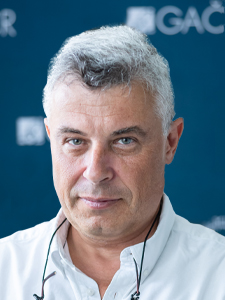
Born in 1967 in Prague, he studied plasma physics at the Faculty of Mathematics and Physics of Charles University and obtained his doctorate in ion physics in Innsbruck (1994). As a high school student, he won the International Physics Olympiad. He researches ion-molecule reactions in the gas phase, focusing on mass spectrometry for the analysis of trace gases and volatile organic compounds. He contributed to developing the SIFT–MS method, which is used in the semiconductor and pharmaceutical industries, and he actively collaborates on its application in interdisciplinary biological, medical, environmental, veterinary, and food research.
Patrik Španěl is the Head of the Department of Gas Phase Ion Chemistry at the J. Heyrovský Institute of Physical Chemistry of the Czech Academy of Sciences in Prague, where he also serves as Deputy Director and Chairman of the Board. He was the principal investigator of several successful projects funded by the Czech Science Foundation (GA ČR) and has experience participating in international projects, including Marie Curie International Training Networks.
In 2007, he was appointed as a Professor of Chemical Physics at Keele University in England, where he previously spent two years (1996–1997) as a postdoctoral research fellow and then worked part-time at the Institute for Science and Technology in Medicine (until 2016). He supervises master’s and doctoral students and has taught “Mass Spectrometry” at the Faculty of Biomedical Engineering of the Czech Technical University in Prague and Keele University. He is a member of the Committee for the Ethics of Scientific Work of the Czech Academy of Sciences, the Scientific Council of the University of Chemistry and Technology in Prague, the Editorial Board of the Journal of Breath Research, and several doctoral committees. He regularly speaks at international conferences and participates in their organisation. He has produced several hundred peer reviews for scientific journals, domestic and international grant agencies, the Research, Development and Innovation Council, as well as on dissertation and habilitation theses.
He has co-authored six book chapters and more than 300 articles in peer-reviewed journals, which were cited over 13,000 times. His research has been recognised with the Czech Academy of Sciences Award for Young Researchers (1999), the Otto Wichterle Award (2002), and the Czech Academy of Sciences Academic Premium (2021).
At the Czech Science Foundation, he served as the Chairman of Panel P206 (2015–2019) and as the Chairman of Discipline Committee OK2 (2018–2019). He was appointed as a member of the Presidium of the Czech Science Foundation in January 2025.
Scientific Advisory Board
The Scientific Advisory Board (SAB) is the conceptual body of GACR. SAB consists of 12 expert members who are appointed and recalled by the Government of the Czech Republic on the Research and Development Council´s proposal. Members are appointed for four years with the possibility of two consecutive terms at maximum. The SAB proposes the Discipline Committees’ composition and scope focus, evaluates the GACR contribution to the development and quality of basic research in the Czech Republic, and proposes necessary measures.
Current Scientific Advisory Board members:
- doc. Dr. Phil. Rudolf Kučera, Ph.D., chair
- prof. Ing. František Štěpánek, Ph.D., vice-chair
- prof. Dr. Ing. Jan Černocký
- prof. RNDr. Petr Dubový, CSc.
- Univ.-Prof. Dr. Anna Pospěch Durnova, Ph.D.
- prof. RNDr. Jan Hajič, Dr.
- prof. Ing. Michal Hocek, CSc., DSc.
- prof. RNDr. Josef Humlíček, CSc.
- prof. Ing. Štěpán Jurajda, Ph.D.
- prof. RNDr. Jitka Klimešová, CSc.
- prof. PhDr. Eva Semotanová, DrSc.
- prof. MUDr. Aleksi Šedo, DrSc., FCMA
Supervisory Board
The Supervisory Board (SB) is the auditing body of GACR. The SB consists of ten members who are appointed by the Parliament of the Czech Republic . Members are appointed for four years with the possibility of two consecutive terms at maximum. The main tasks of the SB consist of financial supervision of GACR, discussing and deal¬ing with complaints about violation of the conditions of Call for Proposals during the evaluation process, and proposing statements obligatory for the Presidium.
Current Supervisory Board members:
- prof. Ing. Jan Roda, CSc., chair
- prof. PhDr. Jana Geršlová, CSc., vice-chair
- PhDr. Pavel Baran, CSc.
- prof. MUDr. Pavel Boštík, Ph.D.
- prof. Ing. František Hrdlička, CSc., FEng
- prof. Ing. Stanislava Hronová, CSc., dr. h. c.
- prof. PhDr. Jiří Mikulec, CSc.
- prof. PhDr. Zdeněk R. Nešpor, Ph.D.
- prof. Ing. Valentýna Provazník, Ph.D.
- prof. PhDr. Ladislav Rabušic, CSc.